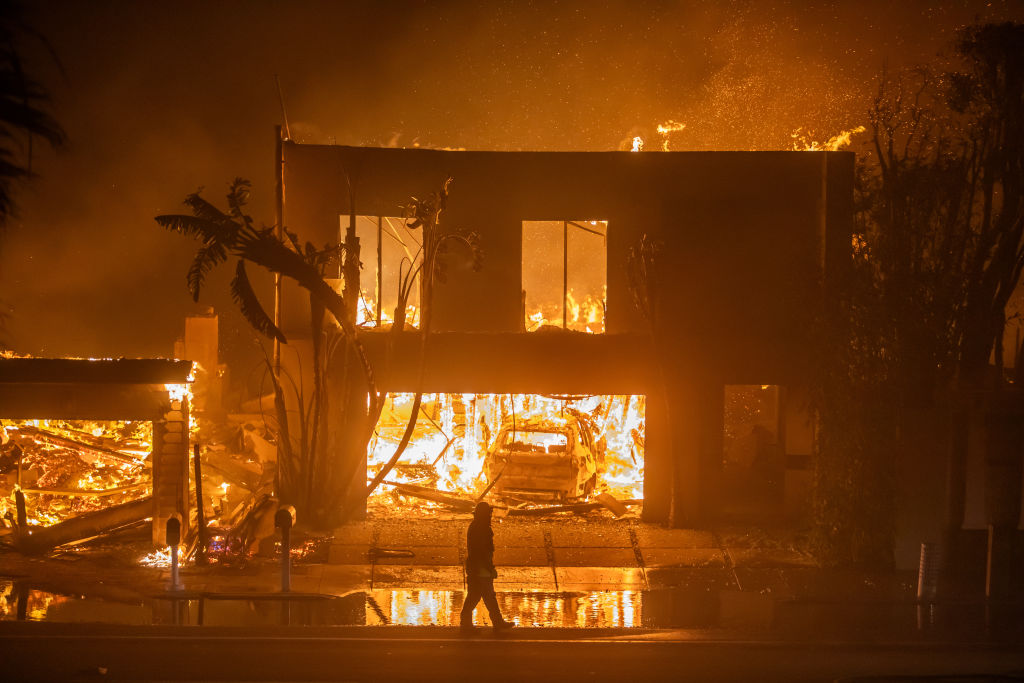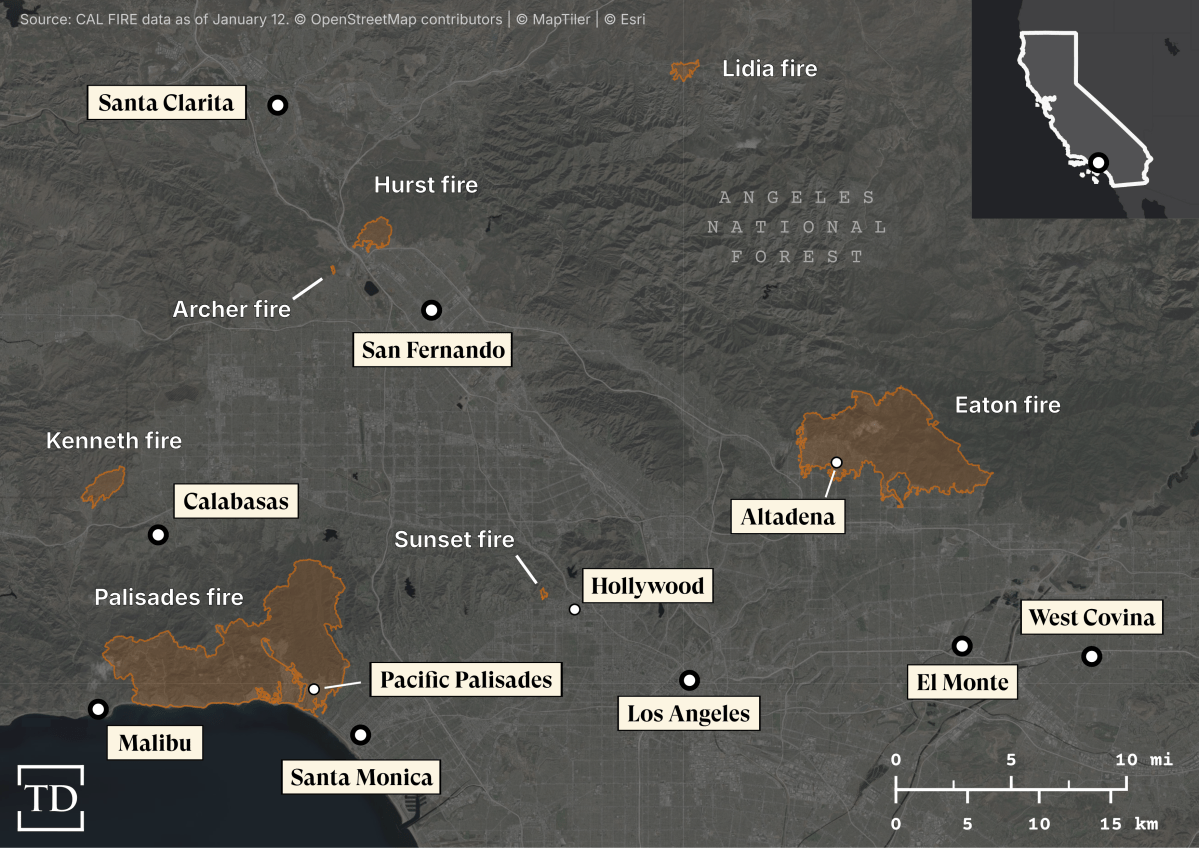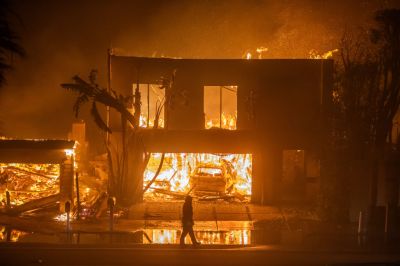Happy Monday! Over the past few days, a “manufacturing error” has caused a donut shortage at Dunkin’ locations across Nebraska and New Mexico. Our hearts go out to all the local law enforcement officers navigating this difficult time.
“We nearly had to cancel our chief’s monthly breakfast this morning because of the shortage,” an Albuquerque Police Department spokesman said. “Fortunately, we averted tragedy when Roma Bakery came through with breakfast burritos.”
Quick Hits: Today’s Top Stories
- Wildfires continued to spread in the greater Los Angeles area over the weekend, bringing the natural disaster’s total death toll to at least 24. The ongoing fires have now damaged or destroyed more than 12,000 buildings and burned through at least 40,000 acres in the neighborhoods of Pacific Palisades, Eaton, and Hurst, forcing 153,000 people from their homes. Though firefighters made progress in their efforts to contain the blazes over the weekend, meteorologists expect strong winds to return early this week, prompting expanded evacuation orders.
- The Supreme Court heard oral arguments on Friday in TikTok v. Garland, a case poised to determine the fate of legislation seeking to effectively ban the popular streaming platform over national security concerns. During more than two hours in court, the justices seemed skeptical of TikTok’s argument that the law constituted a First Amendment violation, potentially paving the way for a ban to take effect if the app’s Chinese parent company—ByteDance—doesn’t divest by January 19. “Congress is fine with the expression,” Chief Justice John Roberts said Friday. “They’re not fine with a foreign adversary, as they’ve determined it is, gathering all this information about the 170 million [Americans] who use TikTok.”
- Israeli fighter jets carried out airstrikes against Houthi targets in Yemen on Friday, according to the Israel Defense Forces. The operation, which targeted two ports and a power plant, came in response to more than 350 missile and drone attacks on Israel by the Iranian-backed group since October 2023. The U.S. conducted its own strikes against the Houthis on Wednesday, U.S. Central Command said, as the militants continue to disrupt international commercial shipping through the Red Sea.
- The State Department raised the reward for information leading to the arrest of Venezuelan President Nicolás Maduro to $25 million on Friday, as the authoritarian socialist leader was sworn in for a third term. The U.S. and other countries have rejected the results of the country’s July election, in which Maduro declared victory over opposition candidate Edmundo González amid widespread evidence of vote manipulation. The raised bounty coincided with the Treasury Department’s issuance of new sanctions on Friday against eight Venezuelan officials accused of committing human rights abuses on behalf of the Maduro regime.
- Special counsel Jack Smith resigned from the Justice Department on Friday after completing his final report on his investigations into President-elect Donald Trump. The news broke in a court filing on Saturday in which the Justice Department urged Judge Aileen Cannon not to extend her three-day injunction blocking the partial release of Smith’s report. Two of Trump’s co-defendants in the classified documents case asked Cannon on Friday to continue blocking Smith’s report until a hearing could be held over Attorney General Merrick Garland’s plan to show volume two of the report—which pertains to the classified documents case—to the chairs and ranking members of the House and Senate judiciary committees.
- Judge Juan Merchan on Friday sentenced President-elect Trump to an “unconditional discharge” in his New York criminal case, designating Trump as a convicted felon but imposing no jail time or probation. As Trump appeared in court virtually from Mar-a-Lago in Florida, Merchan said the sentence represented the only judgment that would convict the incoming president “without encroaching” on his duties. Trump vowed to appeal the sentence, but—because the case was not brought by the federal government—he will not be able to pardon himself upon taking office.
- The Bureau of Labor Statistics reported Friday that U.S. employers added 256,000 jobs in December—up from 212,000 in November and exceeding economists’ expectations. The unemployment rate ticked down slightly from 4.2 percent to 4.1 percent, while the labor force participation rate held steady at 62.5 percent. Average hourly earnings—a measure the Federal Reserve watches closely in its fight against inflation—rose 0.3 percent month-over-month in December, and 3.9 percent year-over-year. Those figures were 0.4 and 4 percent in November, respectively.
Southern California in Flames

Communities that look like “an atomic bomb dropped in these areas.” Bulldozers crashing through abandoned cars blocking roads, as the drivers run for their lives. High schools burned to the ground. And as-yet-unscathed neighborhoods, where residents wait anxiously with garden hoses to defend their homes.
Such are the scenes across Los Angeles County, where fires ignited last week and continued to spread over the weekend in what has become one of the largest and most destructive urban conflagrations in U.S. history. Fanned by some of the strongest Santa Ana winds in recent memory, multiple blazes have ignited throughout the county, covering a total area larger than the entire city of San Francisco. At least 24 people have died amid the disaster, and evacuation orders have forced 153,000 others to flee their homes.
As the fires continue to burn out of control in Southern California, finger-pointing among local and national officials has already begun. But, as multiple sources told TMD, the causes—and solutions—for this disaster do not fit neatly into prearranged narratives.
Firefighters made modest progress against the multiple fires tearing through Los Angeles as winds died down over the weekend, but the largest blazes—in Palisades and Eaton—continue to spread. At 23,713 acres and 14,117 acres, respectively, the two fires cover nearly 60 square miles. As of Sunday night, according to Cal Fire, the Palisades fire was 11 percent contained and the Eaton fire was at 27 percent containment. Several smaller fires (and here, “smaller” still means several hundred acres) have popped up north and east of Los Angeles.
With high winds expected to return this week, and with the immediate priority on protecting heavily populated areas, fire crews have a long road ahead despite progress toward containment. The technical term refers to the percentage of a fire’s perimeter that firefighters have secured, but it doesn’t indicate how much of the blaze has actually been extinguished. “If the winds quit today and we went back to normal winds, it would still take us another week to finish this containment,” Mike Rohde, a former battalion chief of the Orange County Fire Authority, told TMD. “To completely contain the fires, surround them 100 percent,” and begin to extinguish them, “will take time.”

The property damage has already been catastrophic. As of this weekend, weather service AccuWeather placed the total economic loss at between $135 billion and $150 billion—more than ten times the size of the entire Los Angeles annual city budget. More than 12,000 structures have been destroyed, including churches, schools, and homes.
Why are these fires so destructive? One word: wind. The Santa Ana winds—strong, dry gusts that originate inland and sweep out over coastal Southern California—have caused blazes ignited by either power lines or humans to burn out of control. While Santa Ana winds are always strong, the system hitting Southern California last week was especially so, with gusts reaching up to 100 miles per hour. In such conditions, the Santa Ana winds work like a blowtorch for any fire that pops up. Even a relatively small conflagration can produce an “ember cast” that spreads flames into every available field source, said Rohde. “The embers work their way into small spaces of the attics, dead brush, and move into everything.”
National voices have been casting about in recent days for a key decision point or two that can easily be blamed for the fires’ extraordinary spread: misplaced priorities by state and local officials, the lack of controlled burns resulting in a buildup of fuel in wildlands, etc. While in retrospect there are steps local officials undoubtedly wish they had taken, there’s only so much that can be done to prevent blazes from spreading in a place with Southern California’s climate and population density.
“In those fires, two things are important: an ignition source and an extreme wind event. When you get those two, basically all bets are off,” Jon Keeley, a fire ecologist with the U.S. Geological Survey, told TMD. He also noted that while the Palisades fire appears to have spread from wildland in the hills down to populated areas, the Eaton fire looks like it had ignited in urban areas, filled with wooden homes, almost immediately. “The mass destruction was not due to the shrubland vegetation. It was due to the homes themselves, because the homes are made out of material that’s very dry.”
It’s not yet clear how the fires ignited to begin with. One major cause of wildfires, lightning, can be ruled out, said Keeley, as there has been no recent lightning in the region. In wind-driven fire events, “there’s no question, the number one issue is power line failures, and after that, it’s arson,” he noted.
And indeed, there’s reason to believe that power lines may have played a role in sparking the fires, said Bob Marshall, the CEO of Whisker Labs, a company that installs home devices that detect electrical faults, such as sparks caused by falling tree branches. With roughly 14,000 such devices in the Los Angeles area, Whisker Labs was able to map out the massive increases in faults Wednesday around the sites of the Palisades and Eaton fires. While Marshall was careful to specify that he was not making a definitive claim about the cause of the fires, he was able to show TMD maps that displayed electrical transmission lines receiving power, and experiencing faults, in the same place and at the same time as the beginning of the Eaton fire.
The Bureau of Alcohol, Tobacco, and Firearms has launched an investigation into the Palisades fire’s origin, but cautioned that it is “way too early to make determinations.”
But before the precise cause has even been determined—in fact, before the fires are even under control—the search for scapegoats has begun. Los Angeles Mayor Karen Bass has been widely criticized for being in Ghana when the fires began—after promising in a 2021 interview she “would not travel internationally” if elected—and for sometimes wilting under press scrutiny: She was caught on camera stonewalling a reporter asking her questions about her trip, as well as a recent $17 million cut to the Los Angeles Fire Department’s budget.
On Friday, Los Angeles Fire Chief Kristin Crowley piled on, telling a local news reporter that the city of Los Angeles (which presumably included her boss, Bass) had failed her department. “My message is the fire department needs to be properly funded,” she said. “It’s not.” Crowley was almost immediately summoned to City Hall, before appearing at a Saturday press conference with Bass, who sought to quell rumors that Crowley had been fired. “I’ll give her an opportunity to repeat it again, that we have one mission, and that is going to be our sole focus,” said Bass.
Many Los Angelenos have been enormously discouraged by the infighting, as well as the sense that the city was not prepared. “I think we’re all in a state of shock for so many reasons, and to have your public officials blaming and infighting is also discouraging,” said Brad Hertz, a Los Angeles resident who spoke to TMD. “It’s adding insult to injury.”
The blame game has also made its way to the national level. “The fires are still raging in L.A. The incompetent pols have no idea how to put them out,” President-elect Donald Trump wrote on Truth Social Sunday. Trump had previously claimed that the water shortages plaguing the fire department had stemmed from environmental policies related to endangered species of fish, building on speculation that Los Angeles and California had insufficiently prepared water reserves for just such an occasion. “I will demand that this incompetent governor allow beautiful, clean, fresh water to FLOW INTO CALIFORNIA! He is the blame for this,” the incoming president added of California’s Democratic Gov. Gavin Newsom.
Newsom defended the state’s policies and invited Trump to tour the fire damage himself. The president-elect has yet to respond.
There have also been attacks on Crowley, who is a lesbian, and the city government for allegedly prioritizing DEI policies over competence. “What we are seeing [was] largely preventable,” right-wing media personality Megyn Kelly claimed. “LA’s fire chief has made not filling the fire hydrants top priority, but diversity.”
But those who understand how these things work have cautioned against focusing on specific policies or people. “The cities in California and the state itself have some of the best-equipped, best-trained, and best-experienced fire services that we have in the world,” Michelle Steinberg, the wildfire division director at the National Fire Prevention Agency (NFPA), told TMD.
To expert observers, local fire agencies’ response reflected this reputation for preparedness and expertise. “All the resources that were heading to the fire within the first hour were tremendous: bulldozers, tenders, and lots of fire engines and other vehicles,” Ray Bizal, the director of regional operations for the NFPA, who was present at the start of the Palisades fire, recounted to TMD. He also noted that Southern California was the birthplace of mutual-aid agreements between fire departments—firefighters from eight states, Canada, and Mexico are already present in Los Angeles to assist in fighting the fires, bringing much-needed resources to bear.
“Quite frankly, the water situation in the Pacific Palisades was best practice; to have a 3 million gallon hillside reservoir system is exceeding recommended redundancy by a factor of about three,” said Rohde. “Water systems are developed for structural fires that may be a block [in size]; that’s a very large fire on a normal day, but not an urban conflagration like what was experienced in California.”
Meanwhile, the fight over who will pay the mounting disaster relief and recovery costs is just getting started. In one of his final acts of office, President Joe Biden pledged that the federal government would cover 100 percent of the initial response cost, which includes things like clearing debris, building shelters, and paying first responders. “The cost of the debris cleanup is gigantic, gigantic. The cost of replacing the housing is almost exponential,” he noted. “Anybody can give you a number now, they have no idea what they’re talking about. It’s big, big, big.”
And how will the government be footing that “big, big, big” bill? That much remains unclear. In December, Congress passed a $100 billion disaster relief bill, which included $29 billion in FEMA emergency funds but fell short of Biden’s request for $40 billion. Less than a month later, the president now finds himself asking for more funding yet again. “I’m going to make an appeal right now to the United States Congress,” he said last week. “They’re going to have to step up when we ask for more help to get people the kind of help they need.”
On Friday, Rep. Warren Davidson, an Ohio Republican, said that Congress should withhold relief funds from California until the state changes fire insurance and forest management policies. “If they want the money, there should be consequences where they have to change their policies,” he told FOX News.
But for Californians, any talk of recovery is premature. Tens of thousands of Angelenos are today without homes, schools, and places of worship. The fires are still burning, with ominous weather forecasts predicting high winds through Wednesday. And there is little emergency responders can do, beyond protecting what they can and praying that elemental forces subside.
“People need to understand, fire’s been part of the nature of California since the beginning of time,” Brian Rice, president of the California Fire Foundation, said on Saturday. “People can say, and talk, and do, whatever they want, but we’re at the mercy of the weather right now.”
Worth Your Time
- In December, many Syrian Alawites celebrated the collapse of Bashar al-Assad’s regime—despite belonging to the same minority group as the deposed dictator. But the same people now fear for their lives as the Sunni rebels responsible for Assad’s downfall consolidate power, Omar Abdel-Baqui reported from an Alawite-majority village along Syria’s Mediterranean coast. “Masked men have terrorized the village, beating people, looting homes and using anti-Alawite slurs. Some community members have been missing for days after the attacks and are feared dead. Khodr Ibrahim, a 22-year-old resident of the village, said he was playing videogames in a shop when he and his 24-year-old brother were pulled outside by armed men. They pointed their rifles at the Ibrahims, cursing their Alawite backgrounds, staging mock executions and striking the elder brother until several older women in the village persuaded the militants to stop, the family and other townspeople said,” he wrote in the Wall Street Journal. “In nearly two dozen interviews, Syrian Alawites said they are worried about discrimination under the new government and the risk of attacks by the country’s many militias and gangs, who could seek revenge for abuses committed by the Assad dynasty during its long and brutal reign. They point to a collection of disparate incidents in the past two months—including alleged extrajudicial killings, claims of discrimination at checkpoints and the destruction of a religious shrine—that they say are beginning to resemble a pattern of anti-Alawite acts.”
Presented Without Comment
Bloomberg: TikTokers Put Hope in Online Campaign to Get Trump to End U.S. Ban
Also Presented Without Comment
The Hill: Steve Bannon Says He Will ‘Take Down’ the ‘Truly Evil’ Elon Musk
Also Also Presented Without Comment
NBC News: Chuck E. Cheese Makes a Comeback, With Trampolines and a Subscription Program
In the Zeitgeist
After a nearly three-year wait, season two of Severance—starring Adam Scott of Parks and Recreation fame—premieres this Friday and is already receiving stellar reviews. If you want to catch up before the new episodes release, you can stream the first season on Apple TV+.
Toeing the Company Line
- In the newsletters: Nick Catoggio looked at (🔒) the electoral incentives behind Democrats’ shifting immigration policy, Jonah Goldberg contemplated the role of cities while in London, and in Dispatch Faith, Norman Hubbard reflected on what lessons today’s Christians can learn from how first-century Christians addressed each other.
- On the podcasts: Sarah Isgur and David French recorded an emergency Advisory Opinions to unpack Friday’s oral arguments in TikTok v. Garland, Jonah ruminated on everything from the Dutch masters to personal pluralism, and Norman Hubbard joined Michael Reneau on The Skiff (🔒) to discuss what it means to be “beloved.” Keep an eye on your Dispatch Podcast feeds—Jamie Weinstein will be joined by former British Prime Minister Boris Johnson on an episode releasing later today!
- On the site over the weekend: Luis Parrales offered his interpretations of Robert Eggers’ new film Nosferatu, Tal Fortgang dug into Adam Kirsch’s On Settler Colonialism, and Knox Thames argued that the U.S. must prepare to offer support to Syria’s religious minorities.
- On the site today: David Drucker reports on Donald Trump’s efforts to consolidate control of the GOP ahead of the midterm elections and Leah Libresco Sargeant writes on her shifting views about the “death with dignity” movement in this week’s Monday Essay.
Let Us Know
Do you know anybody who has been personally affected by the Los Angeles fires?









Please note that we at The Dispatch hold ourselves, our work, and our commenters to a higher standard than other places on the internet. We welcome comments that foster genuine debate or discussion—including comments critical of us or our work—but responses that include ad hominem attacks on fellow Dispatch members or are intended to stoke fear and anger may be moderated.
With your membership, you only have the ability to comment on The Morning Dispatch articles. Consider upgrading to join the conversation everywhere.